
JERUSALEM—Extremist Syrian Islamist forces have seized control over much of Aleppo, the second-largest city in the war-torn country, raising significant new questions for the U.S. government about its policy in the highly volatile Syrian Arab Republic.
“I think it is concerning if some elements of the anti-Assad forces get their hands on sensitive sites in Syria. There have been reports that they have seized the Syrian Scientific Studies and Research Center, which is where Assad’s chemical weapons program is housed among other military assets,” Jason Brodsky, policy director for United Against Nuclear Iran, told Fox News Digital.
He continued, “Given the background of some of these groups which were formerly affiliated with Al-Qaeda, it raises serious questions and could have implications for Israeli national security.”
The government of Benjamin Netanyahu reportedly met on Friday night to discuss the latest news coming out of Syria.
‘WAR FOLLOWED US’: A SYRIAN FAMILY FLED BEIRUT AFTER ISRAELI BOMBARDMENT TO FACE REPRESSION, BOMBING AT HOME
Vehicles burn after an airstrike against opposition fighters in Aleppo, Syria, late Friday, Nov. 29, 2024. (AP Photo/Ghaith Alsayed)
Former President Barack Obama cut a widely criticized deal with Syrian regime dictator Bashar Assad in 2013 to remove his chemical weapons program. U.S. officials later said that Assad likely retained part of his chemical warfare apparatus. Assad has repeatedly used poison gas on his population to dissolve the democratic revolt that unfolded against his regime in 2011.
There are currently about 900 American soldiers in Syria as part of a mission to defeat the Islamic State. The U.S. military presence in Syria, according to Mideast experts, also helps to blunt the Iranian regime’s attempts to absorb of parts of Syria.
The seizure of most of the two million-person populated city of Aleppo is a stunning military defeat for Assad and his allies, the U.S-designated terrorist movement, Hezbollah, Russia, and the Islamic Republic of Iran.
RUSSIA AND SYRIA BOMB SYRIAN ISLAMIST REBELS AFTER SURPRISE INCURSION
Yet, Brodsky warned that Hayʼat Tahrir al-Sham (HTS), an amalgam of radical Islamist groups that secured the victory in Aleppo, is also a highly dangerous organization for the U.S.
“We can’t forget that one of these groups, HTS has been designated by the U.S. as a foreign terrorist organization. I think Israel’s degradation of Hezbollah emboldened the anti-Assad forces as they smelled blood in the water with this assault on Aleppo. It’s not only Hezbollah’s losses, but also the IRGC’s [Islamic Revolutionary Guard Corps] losses which are testing the Quds Force’s structures in Syria.
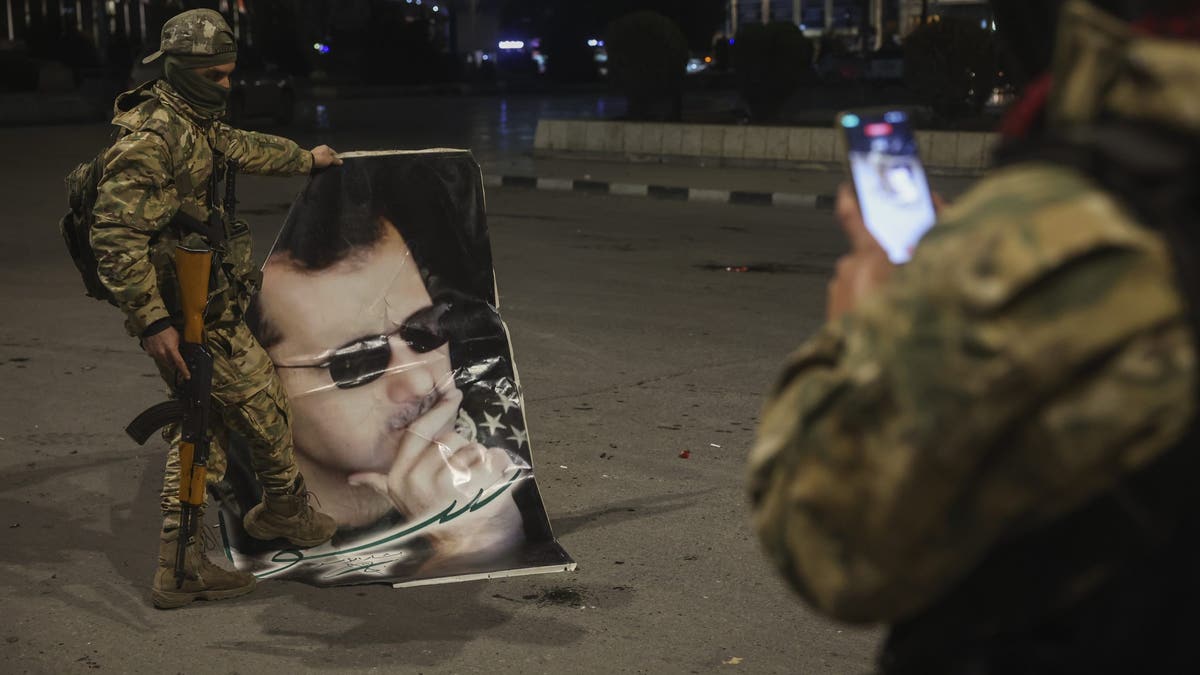
A Syrian opposition fighter takes a picture of a comrade stepping on a portrait of Syrian President Bashar Assad in Aleppo, early Saturday Nov. 30, 2024. (AP Photo/Ghaith Alsayed) (AP Photo/Ghaith Alsayed)
“Let’s not forget that Israel decapitated the IRGC Quds Force Department 2000, which oversees operations in the Levant, twice in the last year alone, not to mention other key commanders in the Syrian theater. That is a loss of relationships, skills and networks that have placed the IRGC at a disadvantage, especially when Hezbollah has been under such strain,” he said.
The United States government has designated both Iran’s regime and the Syrian Arab Republic as state-sponsors of terrorism.
Phillip Smyth, an expert on Iranian regime proxy groups and Syria, who is with the Atlantic Council, told Fox News Digital, “If you were thinking Assad was sending out or had anything elite and functional for fighting forces, recall that nearly every successful offensive for pro-Assad side was executed by Iran and Iran proxies and or Russia since 2013 and 2015, respectively.”
Smyth said that “HTS is a group that is an outgrowth of Al-Qaeda and has connections to Turkey. Their endgame is to create a Talibanesque society with a few tweaks.”
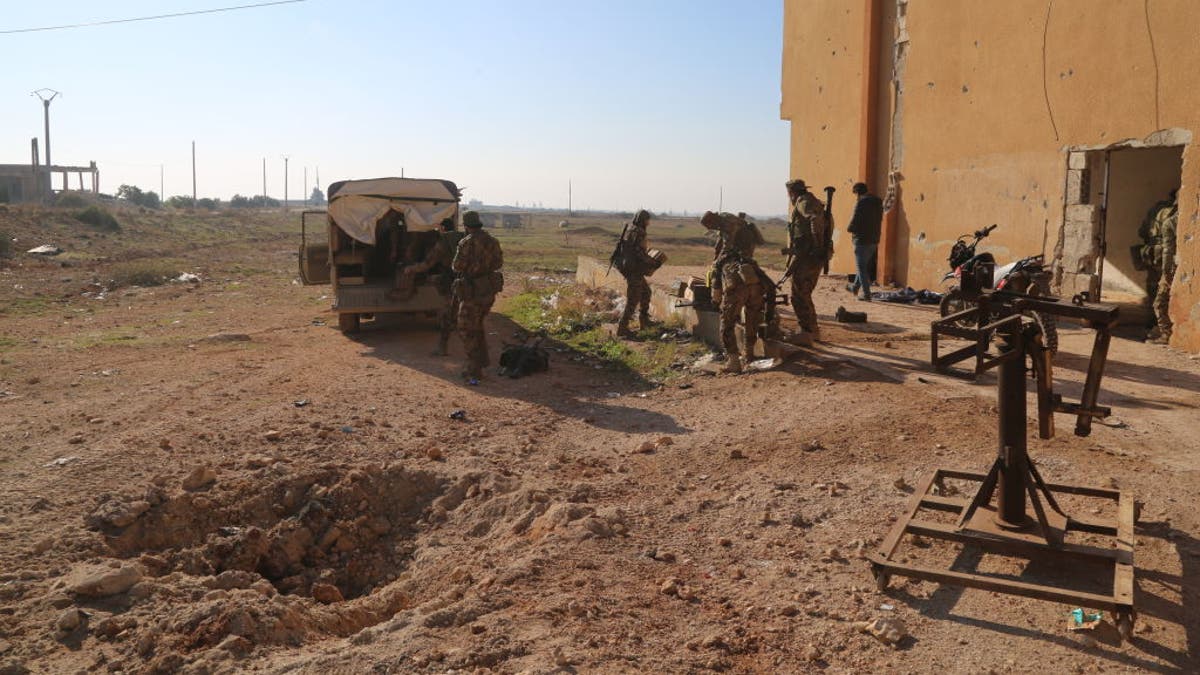
Anti-regime groups take control of some villages western countryside as the clashes between the Bashar al-Assad regime and the opposition armed group Hay’at Tahrir al-Sham (HTS) continue in Aleppo, Syria on November 27, 2024. (Kasim Rammah/Anadolu via Getty Images)
He said, “I doubt the U.S. will be in a position to say we’re hunky-dory dory with this. They attacked us on 9/11, “in reference to the Al-Qaeda origin of HTS. Smyth, however, noted that Assad’s is the other side of the same dangerous coin for U.S interests. He said regarding Assad and HTS, “I don’t think either is a good case. Assad has been very Anti-American. He has allowed Lebanese Hezbollah to metastasize and utilized Sunni Jihad groups” Smith added that “Assad allowed Al-Qaeda to go to Iraq to kill Americans.”
The U.S. allied group, a coalition of Kurdish forces called the Syrian Democratic Forces (SDF), is also present in Aleppo. The SDF played a critical role in defeating the Islamic State in Syria.
NEARLY 30,000 CHILDREN ARE SUFFERING HUMAN RIGHTS ABUSES IN SYRIA, UN-BACKED COMMISSION SAYS
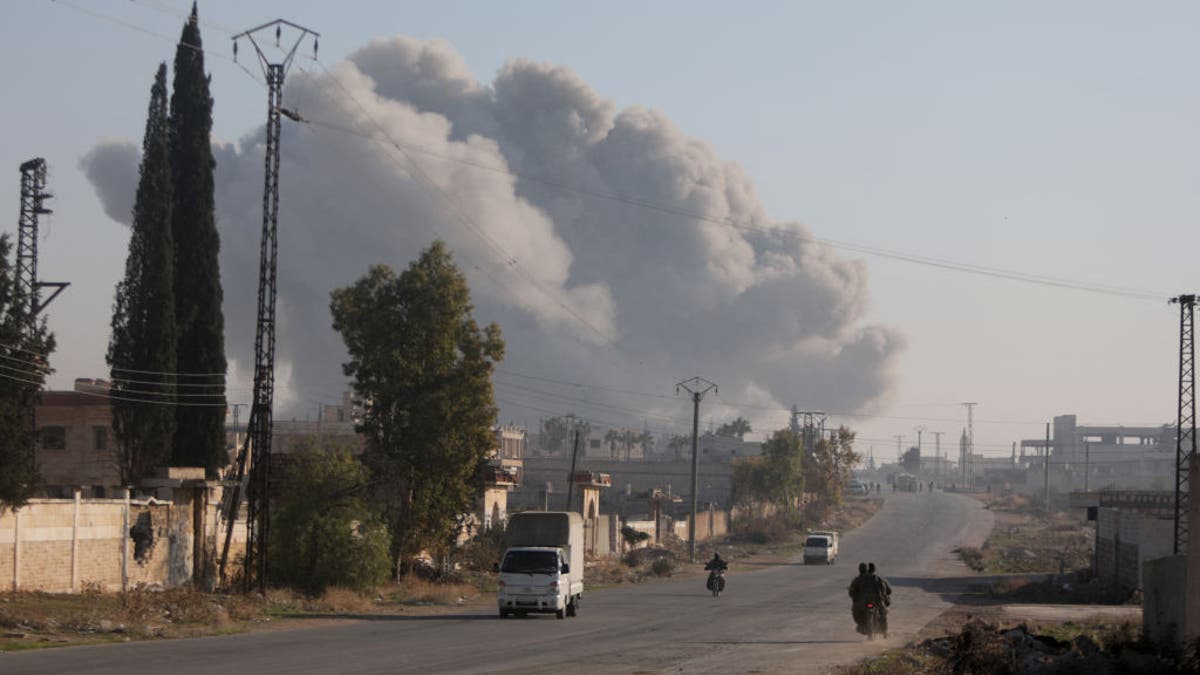
Fighters enter the Rashidin district on the outskirts of Aleppo on their motorbikes with smoke billowing in the background during fighting on November 29, 2024, as Hayat Tahrir al-Sham (HTS) jihadists and allied factions continue their offensive in the Aleppo province against government forces. (Photo by Bakr Alkasem/AFP via Getty Images)
Wladimir van Wilgenburg, a Kurdish studies expert, discussed the SDF and the Kurdish force YPG (The People’s Defense Units) with Fox News Digital. He said “The city of Aleppo is home to two Kurdish-dominated neighborhoods under the control of the Kurdish-led SDF/YPG and a significant number of displaced people from Afrin (which is under Turkish control) living in Til Rifaat in northern Aleppo. It is unlikely the HTS will accept the YPG from controlling the airport. Russia, for the first time, has also carried out airstrikes in Aleppo, killing several civilians and rebel fighters.”
Van Wilgenburg, the co-author of the 2021 book with Dr. Michael Knights on the SDF-U.S. partnership against the Islamic State, continued that “The rising influence of HTS also poses a threat to the YPG’s presence in northern Aleppo. Notably, the YPG/SDF withdrew from Nubl and Zahra without a fight, having moved in after regime and Iran-backed militias previously took control of those towns.”
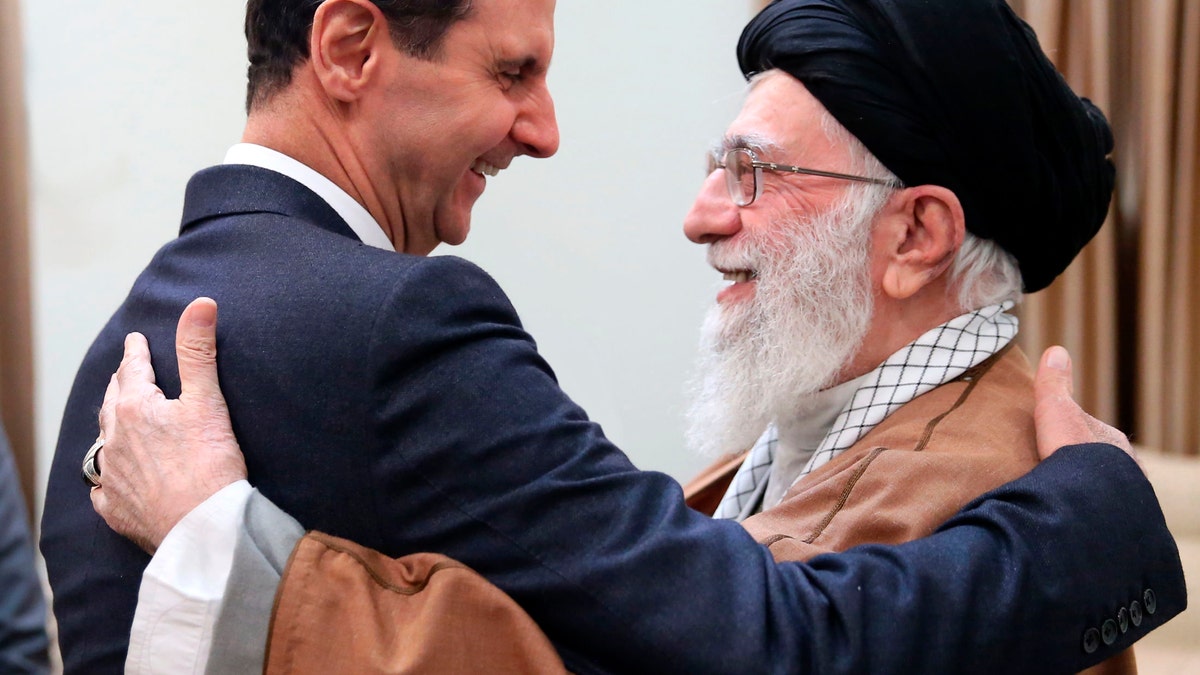
FILE – In this Feb. 25, 2019 file photo, released by an official website of the office of the Iranian supreme leader, Supreme Leader Ayatollah Ali Khamenei, right, greets Syrian President Bashar Assad, in Tehran, Iran. On Nov. 13, 1970, Hafez Assad, a young career air force officer, launched a bloodless coup. Fifty years later, his family still rules Syria. The country is in ruins from a decade of civil war that killed around a half million people, displaced half the population and virtually wiped out the economy. But Hafez’s son, Bashar Assad, has an unquestioned grip on what remains. (Office of the Iranian Supreme Leader via AP, File)
General Hossein Daghighi, Advisor to the Commander of the IRGC, said on Saturday, according to Iran International, “The enemy is incapable of taking any effective action, as the resistance networks have been systematically organized. Their attempts to meddle in Syria will result in their hand being decisively severed, leaving a mark on history that will not be forgotten.”
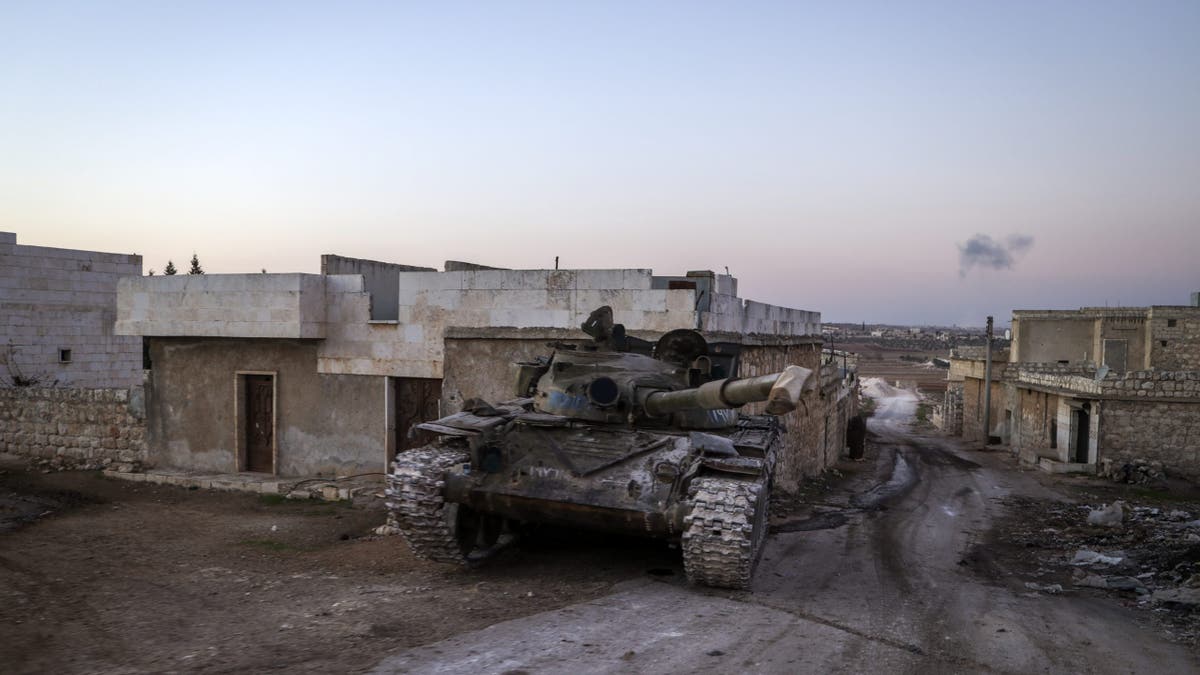
A destroyed Syrian army tank sits in the village of Anjara, western outskirts of Aleppo, Syria, Thursday Nov. 28, 2024. (AP Photo/Omar Albam)
CLICK HERE TO GET THE FOX NEWS APP
The Syrian regime’s military announced their “redeployment operation” in Aleppo. “The large numbers of terrorists and the multiplicity of battlefronts prompted our armed forces to carry out a redeployment operation aimed at strengthening the defense lines in order to absorb the attack, preserve the lives of civilians and soldiers, and prepare for a counterattack,” said Syria’s military.
According to Syria’s military, “Dozens of men from our armed forces were killed and others wounded” as “terrorist organizations were able over the past hours to enter large parts of neighborhoods of Aleppo city.”
Assad’s regime has slaughtered over 500,000 people in Syria since 2011. The U.N. has since stopped tracking the death toll there.




